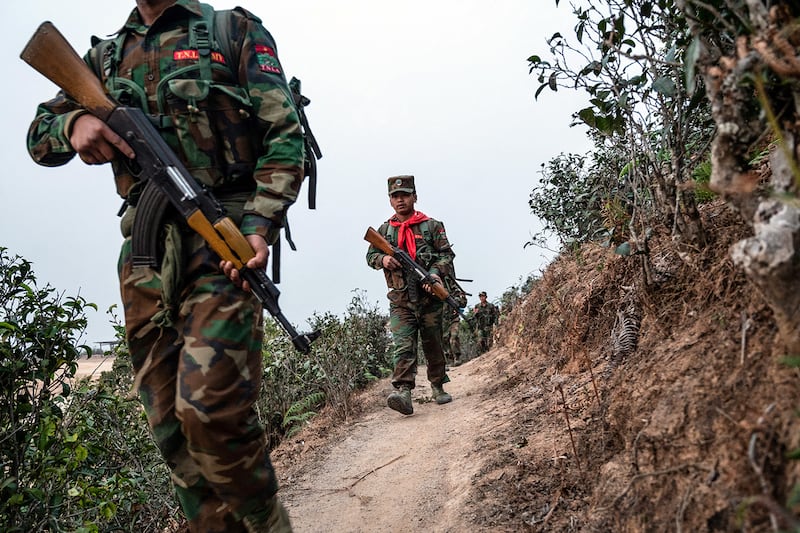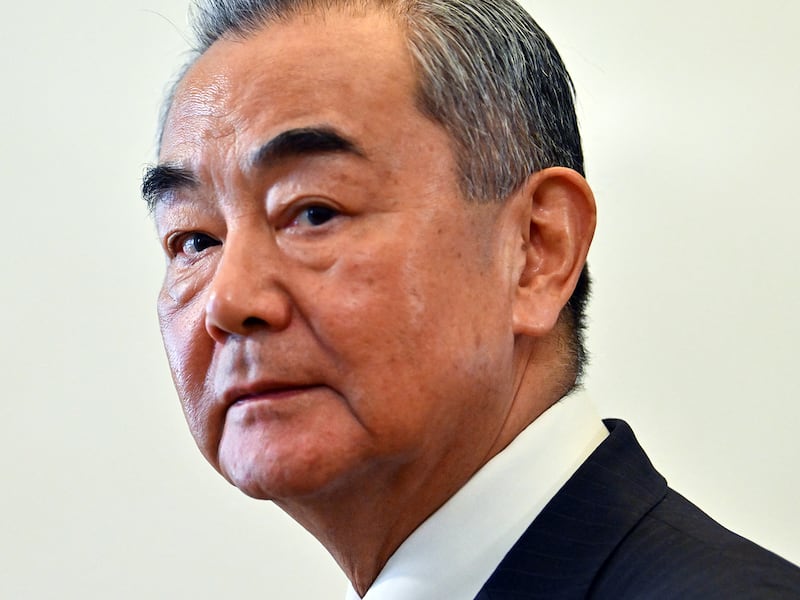It now appears to be a question of “when, not if” Chinese security personnel will arrive in Myanmar, with Beijing looking to secure its strategic interests in the war-torn country and those of its ally, the military junta that has lost large chunks of the country since the 2021 coup.
The Irrawaddy online news outlet reported that the junta formed a 13-member working committee on October 22 to prepare the groundwork to establish a “joint security company” with China.
According to the report, the committee, chaired by Major-General Toe Yi, the junta’s deputy home affairs minister, is currently tasked with “scrutinizing the importing and regulating of weapons and special equipment” until Beijing signs a drafted MOU on forming a “security company.”
After that, according to the narrative from Beijing and Naypyidaw, Chinese personnel would join a “company” — more like a militia — alongside junta troops, which would be tasked with defending Chinese strategic and economic interests in the country.
I’m told that China will send troops from the military and police in a “private” capacity, giving the fiction of detachment.
Yet this would not be a joint venture in anything but name.
Does one seriously think that Chinese troops or police are going to listen to the Myanmar generals who have lost battle after battle to ethnic armies and ill-trained civilian militias over the past four years?
Moreover, there is no reason to think that the China-junta “militia” will stick to merely protecting Chinese nationals and Chinese-owned businesses in Myanmar.
Chinese projects delayed
It is true that Chinese assets have come under increased levels of attack from anti-junta forces in recent months.
There is some logic, if you’re sitting in Beijing and Naypyidaw, in wanting to allow Chinese forces to help command most of northern Myanmar, giving junta forces a better chance of mopping up rebel forces elsewhere.
The civil war has delayed key Chinese projects in the country, such as the long-planned China-Myanmar Economic Corridor between China’s Yunnan province and Myanmar’s Indian Ocean coast.
Strategically key for Beijing is a port it wants to build in Rakhine state, allowing China to import oil and gas from the Middle East without ships needing to pass through the Malacca Strait, a potential chokepoint.
This would be essential in the event of a conflict in the South China Sea, during which the Philippines or Taiwan could try to blockade Chinese trade, including oil and gas imports on which China’s economy depends.
My sources say that the majority of the PLA contingent will be deployed to Rakhine state.
According to statements released by Beijing, almost certainly intended to construct a peace narrative ahead of the deployment, Chinese Foreign Minister Wang Yi told junta leader Min Aung Hlaing in August that he hoped “Myanmar will earnestly safeguard the safety of Chinese personnel and projects.”
When Min Aung Hlaing visited China earlier this month, his first visit since the coup, Chinese Premier Li Qiang instructed him to “take effective measures to ensure the safety of Chinese nationals, institutions, and projects in the country.”
The reality, as Beijing knows well, is that the junta cannot ensure these things.
That’s the entire reason why the “security companies” are deemed necessary by the Chinese government.
Offensive operations
Once Chinese security personnel are on the ground in Myanmar, the fiction that they’re just standing guard outside a few industrial compounds or pipelines will become difficult to maintain.
Indeed, they’re likely to have no choice but to mount offensive operations.
The most obvious reason to expect this is that many Chinese-run enterprises are in territory currently controlled by resistance groups that will presumably need to be taken by Chinese forces.
If not, why would Beijing make a u-turn on its existing policy, which had been to cajole and pay the ethnic militias to leave Chinese entities out of their fight with the junta?

Secondly, after years of dallying, Beijing now clearly thinks that it cannot trust the anti-junta National Unity Government (NUG), presumably because it’s too pro-Western, nor most of the anti-junta ethnic militias – even those who have taken money from Beijing.
Chinese authorities reportedly detained Peng Daxun, the leader of the Myanmar National Democratic Alliance Army (MNDAA), a militia that has inflicted heavy casualties on the junta, after he was summoned to Yunnan for a parlay last month.
This may be a temporary detention pour encourager les autres, or it may be Beijing trying to dismantle disloyal militias more permanently.
Yet, in essence, Beijing has now thrown its weight behind the junta because it presumably believes China’s interests would be best served by an outright junta victory.
So if Beijing thinks the ultimate way of protecting Chinese business interests in Myanmar, for now and in the long term, is for the civil war to be ended and for junta forces to win the conflict decisively, the difference between Chinese security personnel conducting defensive and offensive operations is paper thin.
Why wouldn’t Beijing use its troops to bring about its overarching goal? Why would Beijing overlook the opportunity to end a civil war that it wants over?
Anti-China sentiment
Why would Beijing merely send personnel to defend Chinese factories and pipelines for a few months or years if it thinks there is the possibility that forces hostile to Chinese interests could eventually take power nationally?
Under these circumstances, Chinese personnel would think it justified, under the narrative of “safeguarding the safety of Chinese nationals, institutions and projects in the country,” to wage offensive assaults against anti-junta forces across Myanmar.

Granted, the junta is touchy about being seen as a lackey of Beijing — or about Myanmar becoming a protectorate of China.
That is why Beijing has offered platitudes of a joint “security company,” a fiction to get around Myanmar’s constitution that forbids the deployment of foreign troops.
But what position will the junta be in to dictate what Chinese personnel can do or where they can go once they are in Myanmar?
Lastly, does one imagine that anti-junta forces won’t retaliate against Chinese intervention, especially when that intervention is so clearly on behalf of the regime?
Anti-China sentiment is running high in Myanmar and will boil over once Chinese troops and police step foot in the country.
One can very easily imagine an escalating campaign of attacks by anti-junta forces on Chinese interests – increasing the incentives for Chinese security personnel to launch offensive operations.
Once Chinese boots are on the ground in Myanmar, this means direct intervention by China – not merely an economic peacekeeping effort by joint “security companies.”
And Chinese personnel will have to conduct offensive operations – not just stand guard at Chinese-run factories and pipelines.
David Hutt is a research fellow at the Central European Institute of Asian Studies (CEIAS) and the Southeast Asia Columnist at the Diplomat. He writes the Watching Europe In Southeast Asia newsletter. The views expressed here are his own and do not reflect the position of RFA.
